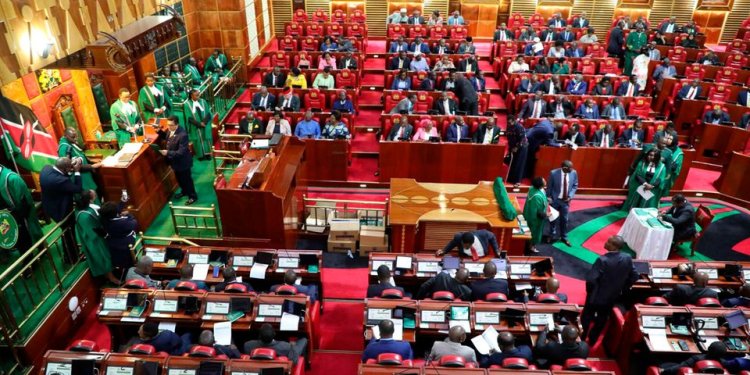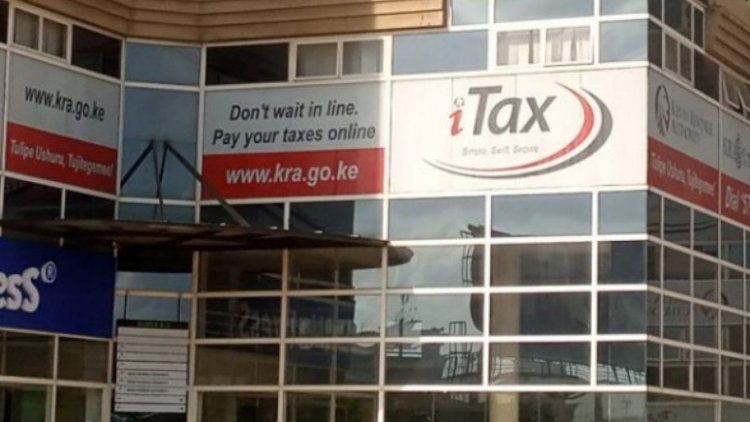Opiyo Wandayi Cries Foul After Govt Delays His March Salary
He further lamented that nearly all civil servants have no idea when or if they will be paid, a situation he added has been degenerating since December 2022.

Minority Leader in the National Assembly Opiyo Wandayi on Friday, April 7 penned a heavy-worded statement lamenting that he was yet to receive his monthly salary for March 2023.
In the statement, Wandayi claimed that the country cannot pay salaries nor can it finance its operations, adding that for the first time since independence in 1963, the government was unable to pay salaries to civil servants and Members of Parliament (MP).
He further lamented that nearly all civil servants have no idea when or if they will be paid, a situation he added has been degenerating since December 2022.
"For the first time in our history, even MPs have not been paid as we head towards mid-month.

Inside a past Parliament session. /DAILY NATION
"Only members of the security services-police and military have been paid as we speak and the reason must be obvious to all. But it won't be long before members of the disciplined forces also begin missing salaries if we continue this way," he complained.
The Azimio la Umoja leader blamed the financial crisis for being the cause of untimely payments, a crisis he believed was triggered by a number of wrong decisions made by the Kenya Kwanza administration at the onset of its reign.
In particular, he argued that the government's move to scrap the subsidies to basic goods, claiming that subsidizing consumption was a waste of money, was implemented at the wrong time.
"Kenya Kwanza then proceeded to appoint people with questionable credentials and serious criminal records and placed them in our revenue and financial systems at the Kenya Revenue Authority, the National Treasury and even the Central Bank of Kenya.
"Kenya Kwanza immediately announced that from the scrapped fuel subsidy alone the Treasury would will save Ksh9.49 billion. Other savings would come in from the removal of subsidies on unga and school fees," he went on.
Wandayi further recalled the massive tax increases by the current regime including a 20 per cent tax on mobile money transactions, 16 per cent on internet transactions, 15 per cent capital gains tax on the transfer of property, VAT on e-books and videoconferencing, among others.
He noted that the net effect of all these measures was supposed to increase revenue collection to between Ksh4 trillion and Ksh5 trillion per year and enable the government to finance its operations.
Wandayi then wondered where the proceeds from taxes and savings from scrapped subsidies were heading to.
"The easy conclusion is that the criminals at KRA are collecting and pocketing taxes as the incompetents at the National Treasury also skim off the revenue while failing to come up with sound policies for cash flow. The result of this theft and incompetence at critical institutions in charge of revenue generation and collection is that civil servants and MPs have gone to Easter without salaries.
"That affects a long chain of people who depend on the salaries of civil servants. It is a sad time indeed for Kenya. We never ever imagined this could happen in Kenya," he went on.
Wandayi lamented that the situation came amidst counties experiencing delays in the disbursement of funds from the National Treasury for four months now, with both national and county governments struggling to pay salaries and service delivery getting compromised with every passing month.
The government currently owes state agencies Ksh204 billion while the counties are demanding Ksh92.5 billion which is the equitable share for the months of January, February, and March.
"It is significant that our cash flow problems have coincided with the collapse of our national currency with no explanation being given. The Kenya shilling has not only weakened against the US dollar.
"The Kenyan currency fell significantly against the Tanzanian shilling - by nearly 10% since last September. This suggests that domestic factors are causing part of the decline of the Kenyan shilling," he added.
Wandayi called on Parliament to take leadership and conduct an inquiry on the financial and economic crisis building up in the country as well as the operations of individuals and systems at the National Treasury, the Central Bank of Kenya and the Kenya Revenue Authority and compel testimony and the production of documents with a view to establishing what might have gone wrong.

"We need to take a close and thorough look at the goings-on at our revenue collection points and revenue sources like the Kenya Airports Authority, the courts, customs, National Social Security Fund (NSSF), aids and grants and revenue administration in addition to probing government spending.
"It is not enough to allow the regime to hide behind explanations like COVID-19, the war in Ukraine and the general economic meltdown around the globe. We believe a lot of our cash flow problems have got to do with the corruption, tribalism, nepotism, incompetence and plain theft at critical revenue collection points, starting with the KRA, in addition to wrong spending priorities," he concluded.

 admin
admin 




